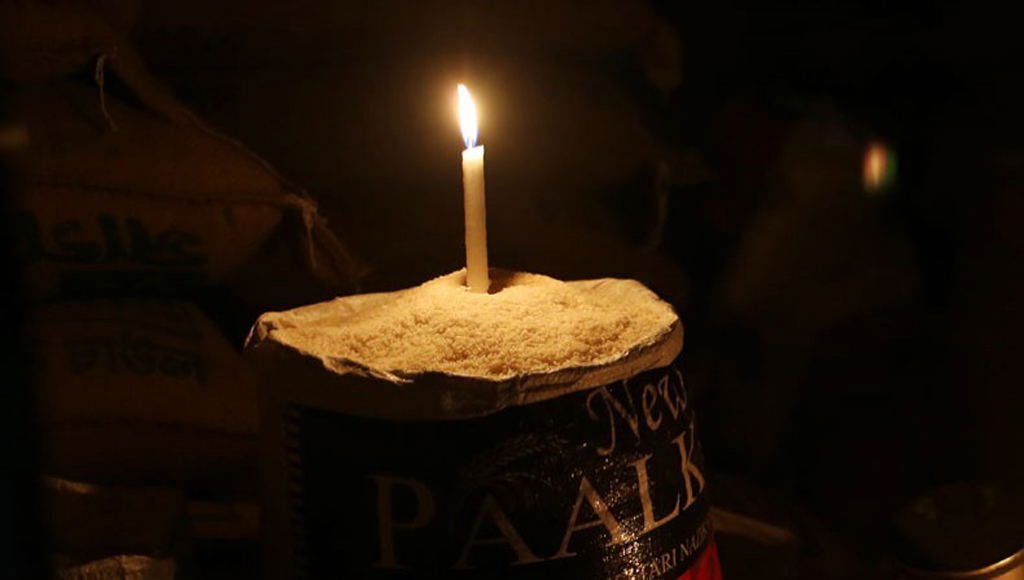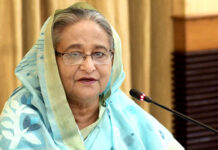
The power shortage doubled to almost 1,000MW on Sunday, compared with the day before, as electricity demand surged amid an unrelenting heatwave sweeping over most of Bangladesh.
The blazing sun heated the surface so much that city streets looked desolate even in the capital on Sunday afternoon, the day supposed to be full of people bustling about, especially for industries resuming operation in full swing following the Eid holidays.
Blue-collar workers reported a dramatic fall in income, by up to three-fourths, as people mostly remained indoors to avoid heat stress that physicians said could trigger heat stroke, particularly among the elderly and sick people.
New Age correspondent in Pabna reported that a farmer died from heatstroke in the district.
Two more deaths were attributed to heat strokes in Sylhet and Meherpur districts, but there was no official confirmation about it.
Some tertiary-level educational institutions, including Dhaka University and Jagannath University, switched to online classes due to the heatwave on Sunday, while the government ordered private English medium schools to suspend in-person classes for the rest of the week.
‘The sun is so bright that it hurts the eyes to look outside. It feels like working inside an oven,’ said Ashik Hossain, a rickshaw-puller, who quit working in the afternoon after finding fewer people on the street.
Dhaka saw its day temperature drop by 2C to 38.2C on Sunday compared with the day before, but the feeling of heat and discomfort remained almost unchanged because of the increased incursion of moisture from the Bay of Bengal.
Bangladesh’s highest maximum day temperature, however, was recorded to be 42.2C in Chuadanga, apparently the hottest part of Bangladesh, where days remained hotter than 40C over the past six days.
New Age staff correspondent in Rajshahi reported that the district continued to get baked at 41.5C for the second consecutive day on Sunday.
Md Moniruzzaman, a rickshaw puller who was sitting under a roadside tree at Bosepara in Rajshahi city, told New Age that his daily income had been halved due to the intense heat.
The Bangladesh Meteorological Department said that Pabna and Chuadanga were swept by a very severe heatwave on Sunday, while Rajshahi, Tangail, Jashore, and Kushtia suffered severe heatwaves.
Mild to moderate heatwave was sweeping over the divisions of Rangpur, Barishal, and Mymensingh, the rest of the Dhaka, Rajshahi, and Khulna divisions, and the districts of Srimangal and Chandpur.
A severe heatwave occurs when the day temperature stays between 40C and 41.9C. A very severe heatwave is when the temperature reaches 42C or goes beyond.
‘The bad news is that no end is in sight to the heatwave,’ meteorologist Shaheenul Islam told New Age.
The BMD, in its daily weather update issued at 6:00pm on Sunday, said that night and day temperatures might remain largely unchanged over the next eight days, starting today.
People’s suffering increased because of a surge in power cuts.
At 1:00am on Sunday, the Power Grid Company of Bangladesh reported that load-shedding stood at 966MW with 14,288MW generated against the demand of 15,300MW.
The load-shedding at the same hour on Saturday was recorded to be 517MW.
The power demand is likely to exceed 16,000MW by today, potentially leading to an even worse power crisis.
‘Load-shedding has become so frequent that we can hardly sleep at night,’ said Hosne Ara, 50, a resident of Kuni Para, Tejgaon.
‘We spend long hours walking in the streets at night,’ she said.
Bangladesh’s installed generation capacity exceeds 27,000MW. Over half of the capacity remained unused because of fuel shortages owing to the dollar crisis.
New Age staff correspondent in Sylhet reported that Abu Hanif Miah, 34, a rickshaw puller, who is a resident of Shivpur village in Lakhai upazila in Habiganj, collapsed in front of the police outpost of Dakshin Surma police station at around 11:00am and died on the way to Sylhet MAG Osmani Medical College Hospital.
Soumitra Chakrabarty, deputy director of the medical college hospital, however, said that establishing heat stroke as the cause of death requires a post-mortem and visceral examination of the body, which is conducted only when wanted by families.
News agency United News of Bangladesh reported the death of a 45-year-old woman, Shilpi Khatun, in Meherpur’s Gangni upazila on Sunday morning because of a heatwave.
New Age correspondent in Pabna reported that a farmer named Alauddin Alal, 43, was initially admitted to the Chatmohar Health Complex with heatstroke symptoms and was later shifted to the Pabna 250-bed General Hospital.
The resident medical officer of the hospital, Kamruzzaman, confirmed the death of Alauddin from heatstroke.
Eleven more such patients were under treatment at the general hospital, he added.
The ongoing heatwave began on August 11, the second heatwave in April, the hottest month.
On April 20, Dhaka saw the day temperature rise to 40.6C, the second hottest day since 1960.
Studies have shown that temperatures have steadily and significantly increased in Bangladesh across all seasons, especially in the pre-monsoon season – March to May.
The productivity and workforce of Bangladesh are seriously under threat from increasing heat stress, studies have warned, urging authorities to introduce measures to minimise the negative impacts of excessive temperatures.
Heat waves, which once used to be confined to western Bangladesh, the BMD said, have become frequent in the central part of the country since 2014, indicating a significant extension in their reach.
New Age correspondent in Barishal reported that productivity declined by a third in some sectors.
Woodworker Rashid Mia said that he sawed up to 15 maunds of wood a day in normal conditions, which was reduced to 6 maunds.
Raham Ali, who resides by the Kirtonkhola River near Muktijuddha Park in Barishal city, spends most of his days by the river.
‘Home feels like hell. The blazing sun and load shedding take turns making our lives unbearable,’ he said.
New Age









